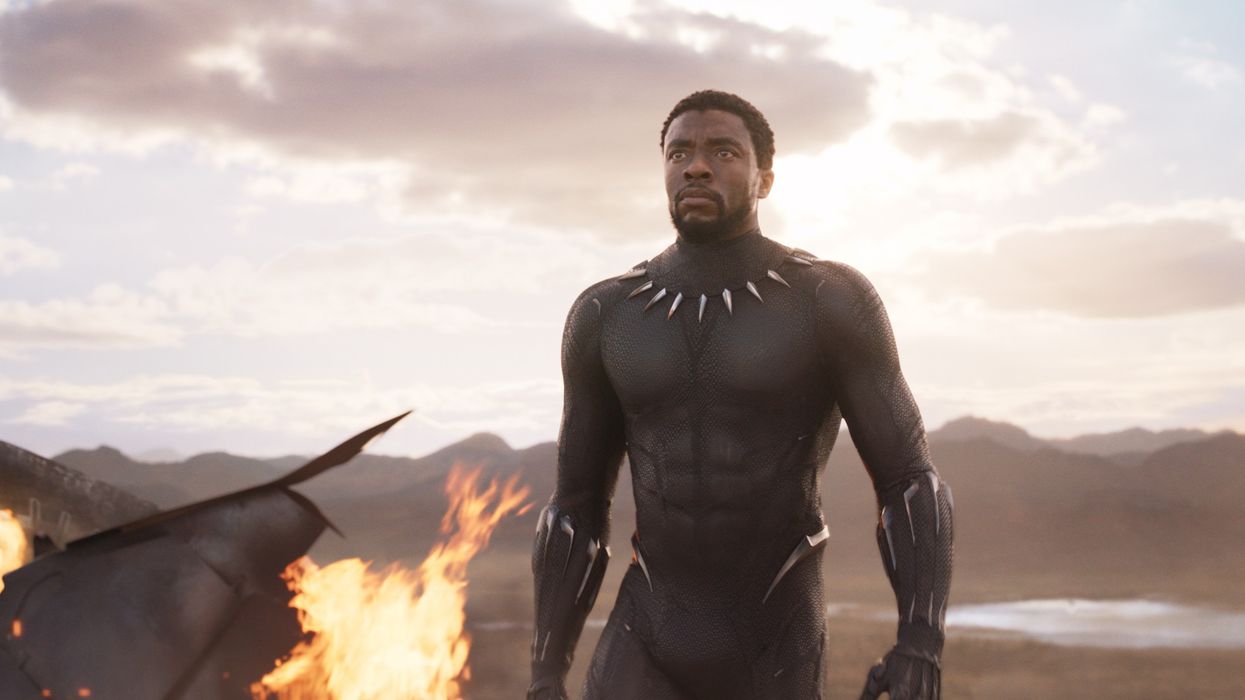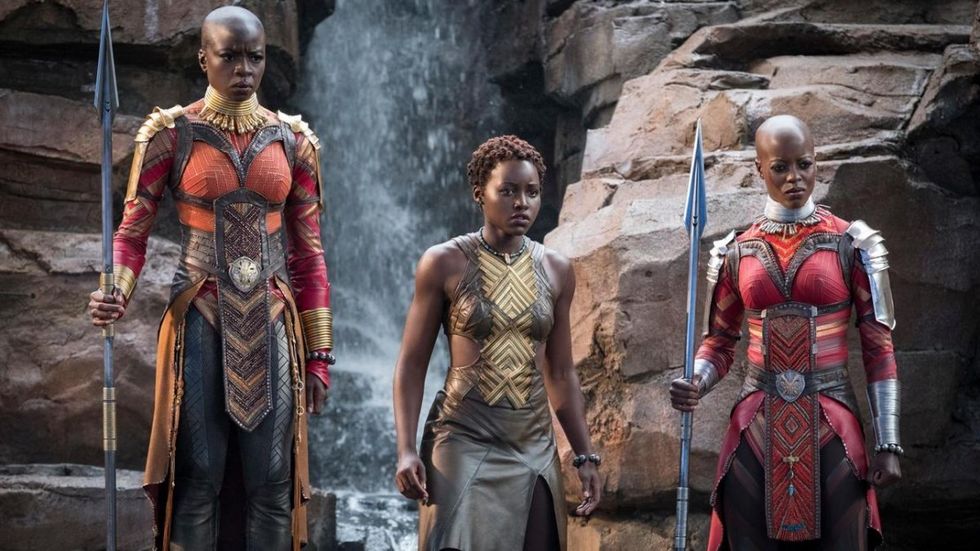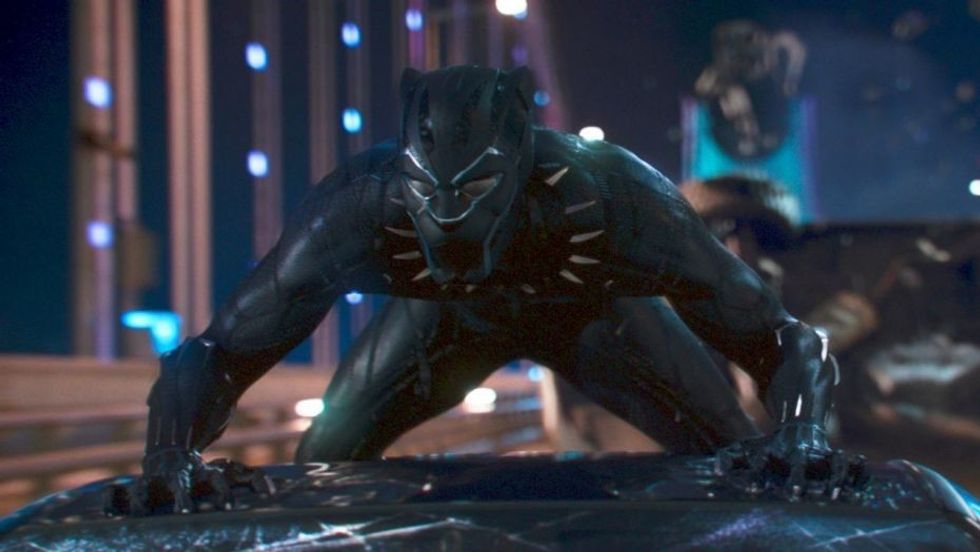How ‘Black Panther’ Composer Ludwig Göransson Worked with West African Musicians to Create an Oscar-Nominated Score
How a long-lasting partnership culminated in an Oscar nomination.

When composer Ludwig Göransson moved from his native Sweeden to pursue his dreams of film scoring at the University of Southern California, he had no idea that he’d find an equally ambitious collaborator, and that their partnership would lead them both to the 91st Academy Awards. His partnership that film school classmate, Ryan Coogler, began with the filmmaker’s early shorts, Fig and Locks.
When it came time for Coogler to make his feature debut, Fruitvale Station, Göransson joined him again, working with the director to incorporate sounds from settings into his compositions. The director and composer continue to work together, including a movie you might have heard of, Black Panther, the first Marvel movie to earn a nomination for a Best Picture Oscar.
Göransson’s scores are not your typical Hollywood bombastic fare, and in our conversation about Oscar nominations and working with Coogler, Göransson also break down the extensive research he conducted for Black Panther and what western audiences may not realize they’re missing when listening to his score.
No Film School: What was it like to find out you were nominated?
Ludwig Göransson: It was incredible. I was very surprised. We [my wife and I] were watching it on our phone from bed, so it was kind of a shock that then turned into incredible joy. I felt extremely honored to be nominated for the project. It’s such an important project to me and for the artist that I’ve been collaborating with for nearly 10 years now.
NFS: How did your partnership with Ryan Coogler begin?
Göransson: I moved to the States when I was 22, and I didn’t know anyone there. Both Ryan and I were at USC at the same time, and I was in the film scoring program and he was in the directing program.
We met at a party just randomly. We played pool together, and we started talking about music. He started naming all these Swedish independent artists that he loves. I was like, how do you know all these Swedish artists? It was 2007, and I thought that was really strange. Then we started talking about film, and we kind of bonded. He was one of my first American friends.

NFS: What made you decide to go to film school in the U.S.?
Göransson: Growing up in Sweden, I was always listening to American music and watching American films. My favorite artists were American. It was my dream to score Hollywood films. When I looked online in 2006/2007, USC was the school that came up for film scoring. I read about the professors in the program that were all working in the business, and that made the decision pretty easy.
NFS: After you graduated film school, how did you start your career?
Göransson: Right as I graduated, I got a job as an assistant for an incredible film composer, Theodore Shapiro, as he was scoring Tropic Thunder. I went straight into the studio world to learn. He was mentoring me for two-to-three years as I was working for him, and he got me my first professional scoring job, which was for the TV show, Community.
NFS: What was it like to then reconnect with Coogler for his feature debut, Fruitvale Station?
Göransson: The process now is not much different than when we started 10 years ago. We still start projects with the same enthusiasm of doing something new and different, coming up with new ways to experiment. Something that we started early in our collaboration was to incorporate sounds into scores, working very closely with sound design. For Fruitvale Station, I went to the BART station and recorded train sounds, modulated them, and transform them into musical elements.
For Creed, I went to the boxing gym, and I recorded a boxer doing his workout for two days. Like, jumping the jump rope, breathing heavily, hitting the bag, and I took those elements and made them into beats and rhythm and used that in the score. For Black Panther, we went in with the same idea but on another level.
NFS: How much of another level?
Göransson: Immediately after I read Ryan’s script, I told him the only way I could score this movie is to go to Africa, immerse myself in the culture, and really study and learn the musical language.

NFS: How much research did you end up doing for Black Panther?
Göransson: I went to West Africa before they started shooting the movie, as Ryan was writing the movie. I had been to Gambia when I was 20, and I took a month to study the music of four different tribes. That was my first glimpse into how complex West African music is, the drumming especially.
13 years later, there was something calling me back to West Africa. It helps that I have this connection to this incredible artist, Baaba Maal, from Senegal. I called him, and he answered, “I’m going on a festival tour, and you can join me on tour.” My wife and I booked two tickets to Senegal without any idea of what to expect.
We pull up to the house, and we walk in and Baaba Mal is sitting in the corner, surrounded by men and women, dressed in beautiful clothes, they’re singing to him, giving him gifts of food and land, so he can build on it and contribute to the welfare of the village. We were just a part of this beautiful ritual. He invites us to join him, and everyone was sharing this big plate of goat and rice to eat with our hands.
African time is very different. When I started to record musicians, I would start at 2 p.m., and people would show up at 3, and we had to eat first for two hours, then we had to drink tea and then when the right spirit and the right energy is there, you can start recording.
Later, at 2 a.m., it was time to go to the concert. We drove around to the back of the stage, and there are kids out there. It’s three in the morning, and people are dressed up to the T. People had been traveling for days for this concert from surrounding villages. The energy was so intense, and finally, Baaba Mal starts singing, welcoming people for being there. It’s so beautiful. We had been on a road trip for 48 hours. The band starts playing, everyone starts dancing. People walk up to Baaba Mal during the concert to give him money and show him their appreciation. I felt like we were in the right place at the right time.
"Every time he appears in the movie, he’s accompanied by the sound of the talking drum saying his name."
NFS: What was some of the other research for Black Panther? Did you incorporate new sounds and instruments you hadn’t used before?
Göransson: We were on tour with them for about a week, in villages every night and driving every day. I got to hang out with his band and talk to them. One instrument that fascinated me was the talking drum. The player in his band, Massamba Diop, when I heard him play, I never heard a talking drum sound so...it really sounded like a voice. He told me about the instrument, it’s the oldest communication device. You can send coded messages to people. You’re hitting the drum at different pitches, so you’re basically saying words.
He told me, “When I was a kid playing with my friends, my dad would hit the talking drum saying my name to tell me that dinner was ready, so I went back to the house.” His family is a family of talking drum players, and they have their own stories from generations ago. He’s a griot, a storyteller.
I asked him how he would say "T’Challa" on the talking drum, and he played it for me. I thought it was so cool and effective. I asked what happened if you had five talking drum players playing that together? So we got an ensemble together, and we recorded everyone playing T’Challa on the talking drum, and that became one of T’Challa’s themes in the movie. Every time he appears in the movie, he’s accompanied by the sound of the talking drum saying his name.
NFS: Did other characters also have coded sounds in their themes?
Göransson: Yeah, there’s so many coded messages in the music that I think Americans may not know. But if you’re from West Africa, as soon as you hear the music, you understand what’s going to happen. Like there’s a rhythm you play on the talking drum when someone comes back that’s been gone a long time. It’s pretty common in Africa for a son or a man to leave their village and their family to go out into the world and make money, and then they come back after 20 years and no one’s heard from them. There’s a big celebration for them and there’s a special rhythm you play for them on the talking drum. There’s a part of the movie where T’Challa comes back from being dead, and you hear this rhythm being played on the talking drum.
There’s a special rhythm for a challenge, like when a younger man challenges an older man to claim he’s ready to take over the household. This rhythm’s been played for thousands of years in those rituals. We decided to use that rhythm in the M’Baku waterfall fight when M’Baku challenges T’Challa for the throne. Even before the fight begins, the rhythm starts, so just by hearing the music, people in West Africa will understand what’s going to happen.
"After the movie came out, I started to get calls from Baaba Mal, Masssamba, and all the other African musicians I worked with in Senegal, they called me and told me how proud they were to hear their music being represented in front of millions of people all over the world."
NFS: So after you’ve gathered all these sounds, what’s next?
Göransson: They start shooting, and I start experimenting with these sounds that were recorded of the traditional instruments. What’s interesting about Wakanda, it’s a country that was never colonized, but it’s a country with the most advanced technology in the world. So, I’m blending in modern production and hip hop to make it sound futuristic, Afro-Futurism. Four months later, I see a first cut that’s four hours long and has no music. Ryan doesn’t temp any music in his movies. So, I watch it, and I call my wife crying, "this is the new Star Wars of our generation."
Watching the movie, there are some incredibly big sweeping scenes. I understand that what I need to write also needs to have the grandness of a cinematic western classical orchestra. That becomes the biggest challenge: how do I work a classical orchestra with African music and still have the core of the soul for the score be African?
NFS: What was your reaction to seeing the cultural reach of Black Panther grow worldwide?
Göransson: I was so happy. After the movie came out, I started to get calls from Baaba Mal, Masssamba, and all the other African musicians I worked with in Senegal, they called me and told me how proud they were to hear their music being represented in front of millions of people all over the world. For me, that was the most gratifying part of the whole process.

 "'Back Home"via Mercedes Arutro
"'Back Home"via Mercedes Arutro 'Back Home'via Mercedes Arutro
'Back Home'via Mercedes Arutro 









